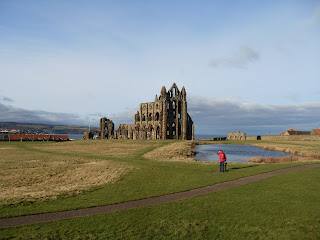When King Oswiu founded the monastery on the headland of modern-day Whitby he did so to gain control over the area, ensuring that the souls of the inhabitants adhered to a religious house under his control, but also - and perhaps more importantly - affirming peaceful relations between the Bernicians and the Deirans by appointing Hild, niece of King Edwin of the Deirans, as its abbess. In 664 a synod was convocated here to settle the dispute concerning when to celebrate Easter. The two conflicting views were the Roman and the Ionian, and the conflict was due to the different calculation tables used in those traditions. Since Easter is the most important celebration of Christianity it was naturally a cause of concern, perhaps especially from rulers desiring as little divison as possible within their realms.
At the time of the synod the location of the abbey was named Streoneshal and here King Oswiu - after a debate between the opposing parties - decided to follow the Roman calculation and also to adopt Roman liturgy. Oswiu himself was, according to Bede, strongly rooted in the Irish Christianity of the Ionian tradition, yet he nonetheless favoured Rome; either due to his acknowledgement of the fact that Roman culture was on its rise, or being convinced as a Christian that Rome was the Church of God founded upon Saint Peter's tomb.
When standing by the desolated ruins of this once so vibrant religious centre, I for my part could not avoid feeling a sense of melancholy as I saw that the only thing resembling liturgy was the cries of circling gulls and the ravens nesting in the towers. The comparison struck me as a nice poetic conceit, and I kept working it over in my head until I eventually composed a sonnet. The poem is meant to evoke a sensation of an era long gone contrasting past and present, and I do in no way claim to present an accurate description of the synod itself. Some errors may be present due to ignorance.
Synodalia. Streoneshal 664 AD.
Yearly the North Sea carves its tithe of land
Out of the fissured rock; the greedy waves
Out of the fissured rock; the greedy waves
Attempt to place their sigil on the sands
And roar when they achieve not what they crave.
So there they stand, all ranged along the nave,
The king and clergy, mighty men of power
Ordained by God and put on earth to save
Mankind from sin; the bell chimes in its tower,
A sound to soothe the dead men in their bowers,
Their lodings in the earth; the king sets down:
"We follow now the Roman book of hours."
"We follow now the Roman book of hours."
His words are followed by a murmured sound.
The land still yields itself unto the sea,
While gulls and ravens sing the liturgy.
- York, January 13-15 2011
(...) gulls and ravens sing the liturgy.
Notes
the greedy waves: as mentioned in the previous blogpost it is striking how much of the land has been eroded by the sea since the days of Hild and Oswiu. This only enhances the melancholy since it is evident that some day in the future the ruins of the monastery will be swallowed by the North Sea.
ranged along the nave: the Anglo Saxon churches were basilicas and in Northern England the chancels were square-ended. It may therefore be the convocated were ranged along the nave rather than gathered in the chancel. Sadly, nothing remains of the Anglo Saxon monastery and the question must remain unanswered.
Ordained by God: the idea that the king was ordained by God to rule the worldly affairs is based on Augustine's teachings in De Civitate Dei and at the time of Oswiu must have been known at least by well-read clerics. Whether this ideology was known in England in the 7th century is sadly beyond my knowledge.
the bell chimes in its tower: unlike later churches the Anglo Saxon basilicas did not have belfries, but a bell was placed in a wooden structure nearby. Consequently the phrase must not be considered in a literal sense.
the dead men in their bowers: archaeologists have discovered 1000 graves within the Abbey premises. The numbers for nearby churches from the period are about 20 at the most. All these graves were of course not present at the time of the synod.
the Roman book of hours: A book of hours is a book of liturgical texts to be sung at the services of the Medieval church. I do not know whether the term existed at the time of the synod or whether King Oswiu was familiar with it, but in all likelihood this is an anachronism. However, in this sonnet it is meant as a metaphor for liturgy in general and is therefore hopefully acceptable.





Nice sonnet, as always. In felt there was something amiss in the last line there for a moment, but when I read it out aloud, properly, it turned out it was just me.
SvarSlettThank you very much. It is always good to have feedback from diligent minds. It might, of course, not be you at all, as some of my sonnets occasionally are a bit amiss in various parts.
SvarSlett